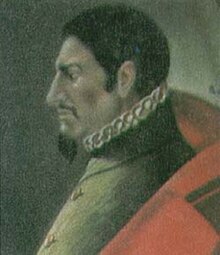Juan Buenaventura de Borja y Armendia
| Juan Buenaventura de Borja y Armendia | |
|---|---|
| Presidente de la , 1605 – 1628 | |

Portrait of Juan de Borja y Armendia
|
|
| Predecessor | Francisco de Sande (In title) |
| Successor |
Sancho Girón de Narváez (In title) Juan de Borja y Miguel (Dynastic) |
|
Full name
Juan Buenaventura de Borja y Armendia
|
|
| Born | 1564 Gandía, Valencia, Spain |
| Died | 1628 , New Kingdom of Granada, Spanish Empire |
| Buried | Catedral de Santa Fe de Bogotá |
| Family | House of Borja |
| Spouse(s) | Violante Miguel de Heredia y Forcadell |
|
Issue
Juan de Borja y Miguel
|
|
| Father | Fernando de Borja Aragón y Castro |
| Mother | Violante de Armendia |
Juan Buenaventura de Borja y Armendia (b. 1564*, Gandía, Valencia - d. 1628, Santafé de Bogotá) was a Spanish noble of the House of Borja who served in multiple positions of power throughout the New Kingdom of Granada. He is perhaps best known for serving as the President of the .
Juan Bueanaventura was the son of Fernando de Borja Aragón y Castro and his wife, Violante de Armendia. He was the grandson of the Duke of Gandia, Saint Francis Borgia, third general of the Society of Jesus.
Upon completing his bachelor's education in the arts at the University of Alcalá, he enrolled himself in the University of Salamanca, where he further pursued a degree in canon studies.
He was legitimized by King Philip III of Spain during the Courts of Valencia on 14 January 1604, with a pedigree towards the military branch of the kingdom.
He carried out various functions within the New Kingdom of Granada; amongst them was his most famous role as the President of the , a post to which he was named in 1605. He was elected the Audencia's seventh president at 41 years of age, on 2 October 1605. He would continue uninterrupted in this post until his death 22 years later.
During his mandate, he carried out various campaigns against the local indigenous people of his territory. The most intense campaign was the pacification of the Pijao people, or the Federación Pijao, between 1605 and 1615. He further installed the Sancta Tribunal de la Inquisición at Cartagena de Indias. He ordered the creation of a grammatical process defined for the Chibchan languages and extended the collection of the Alcabala to many cities where it was previously not enforced.
...
Wikipedia
